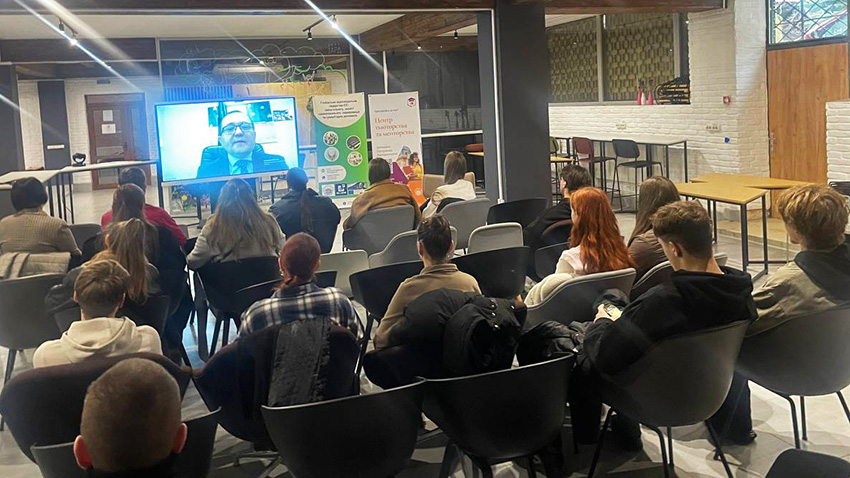On November 4, 2025, as part of the implementation of the project "EU Global Responsible Leadership: Climate Change, Environmental Protection and Humanitarian Aid" (EU_LEAD) with the support of the Erasmus+ Jean Monnet program, a public lecture by Oleksandr Plodysty, a Ukrainian diplomat, Consul of Ukraine in Gdansk, was held on the topic: "Consular assistance to refugees from Ukraine after February 24, 2022".
Using the example of his own consular district, the lecturer revealed two blocks of questions: 1. How has the Republic of Poland helped/is helping Ukrainians in Poland since February 2022? 2. How has the Republic of Poland helped/is helping Ukrainians in Ukraine since February 2022? At the beginning of the full-scale invasion, the Republic of Poland promptly adopted three laws to help Ukrainians, such as: 1. On access to the labor market; 2. On access to medical services; 3. About compensatory services (for children, housing rent, etc.).
Not only representatives of the Polish government, society, Polish business, but also Ukrainians who lived in Gdansk before the war actively learned about providing assistance to Ukrainians. Such support, the Consul emphasized, is unprecedented, which laid the foundation for today's Ukrainian-Polish cooperation. At that time, it had a different dimension: political support for Ukraine in the international arena by the Polish political elite; assistance in providing free housing for Ukrainian poor, because 60 thousand Ukrainians arrived in Gdansk alone, when the city's population was 450 thousand; shelter for Ukrainian orphans (about a thousand children from Kyiv region, Zaporizhia and other cities of Ukraine arrived in this Pomeranian Voivodeship). A train ran to Przemysl to bring Ukrainian refugees to Gdansk free of charge with qualified Ukrainian-speaking personnel (psychologists, social workers, etc.); provision of humanitarian aid by Polish society, etc. Thus, a humanitarian hub was created in Gdansk, which helped Ukrainians find housing, work, food, receive legal advice, etc. Humanitarian aid was also directed to Ukraine–including medical and fire trucks, equipment for restoring the energy system, which is critically important for the safety of the population during the Russian aggression.
A special role in those extremely difficult months was played by the Consulate of Ukraine in Gdansk, which, according to Oleksandr Plodisty, was looking for non-standard solutions to non-standard problems. At the initiative of the institution's employees, an aid point was created, including humanitarian. The representations of international organizations in Poland, mainly UNICEF and USAID, also joined in providing humanitarian support to Ukrainians.
Many integration projects have been implemented: children's leisure; free legal support; educational assistance; "Knots of Victory"; numerous actions in support of prisoners of war; opening of toponyms in honor of solidarity and support for Ukraine (for example, the Free Ukraine Square appeared in Gdynia), etc. Currently, the Gdansk authorities are working on a project to recreate the post-war Mariupol.
The Consul also touched on the problems of humanitarian cooperation today, which is largely due to the change in public sentiment in Poland towards Ukrainian refugees. The reasons for this are war fatigue, depletion of resources, etc. However, the provision of assistance continues, albeit in a somewhat smaller format, because the main goal of such steps is to bring Ukrainian refugees to the level of self-sufficiency. To a certain extent, Poland is succeeding in this. However, Oleksandr Plodysty is convinced that Ukrainian-Polish relations are destined to be better, because this is in the interests of both peoples.
In total, more than 70 students and teachers took part in the event, who joined an interesting discussion at the end of the event. The EU_LEAD project team expresses its gratitude to all participants for the interesting discussion and exchange of views, as well as to the Mentoring Center for professional cooperation in the project activities.
The meeting took place in the student space "L.I.S." (Learning Inspiring Space)–a modern location for learning, communication and development of youth and the academic community, which was opened thanks to the support of Jacob Dalhoff, CEO of MatchOffice Ukraine, and Service Ukraine LLC.




